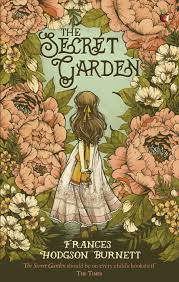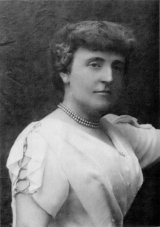The Secret Garden Page #3
The Secret Garden is a novel by Frances Hodgson Burnett first published in book form in 1911, after serialization in The American Magazine. Set in England, it is one of Burnett's most popular novels and seen as a classic of English children's literature. Several stage and film adaptations have been made.
“I don’t believe you,” said Mary; and she turned her back and stuck her fingers in her ears, because she would not listen any more. But she thought over it a great deal afterward; and when Mrs. Crawford told her that night that she was going to sail away to England in a few days and go to her uncle, Mr. Archibald Craven, who lived at Misselthwaite Manor, she looked so stony and stubbornly uninterested that they did not know what to think about her. They tried to be kind to her, but she only turned her face away when Mrs. Crawford attempted to kiss her, and held herself stiffly when Mr. Crawford patted her shoulder. “She is such a plain child,” Mrs. Crawford said pityingly, afterward. “And her mother was such a pretty creature. She had a very pretty manner, too, and Mary has the most unattractive ways I ever saw in a child. The children call her ‘Mistress Mary Quite Contrary,’ and though it’s naughty of them, one can’t help understanding it.” “Perhaps if her mother had carried her pretty face and her pretty manners oftener into the nursery Mary might have learned some pretty ways too. It is very sad, now the poor beautiful thing is gone, to remember that many people never even knew that she had a child at all.” “I believe she scarcely ever looked at her,” sighed Mrs. Crawford. “When her Ayah was dead there was no one to give a thought to the little thing. Think of the servants running away and leaving her all alone in that deserted bungalow. Colonel McGrew said he nearly jumped out of his skin when he opened the door and found her standing by herself in the middle of the room.” Mary made the long voyage to England under the care of an officer’s wife, who was taking her children to leave them in a boarding-school. She was very much absorbed in her own little boy and girl, and was rather glad to hand the child over to the woman Mr. Archibald Craven sent to meet her, in London. The woman was his housekeeper at Misselthwaite Manor, and her name was Mrs. Medlock. She was a stout woman, with very red cheeks and sharp black eyes. She wore a very purple dress, a black silk mantle with jet fringe on it and a black bonnet with purple velvet flowers which stuck up and trembled when she moved her head. Mary did not like her at all, but as she very seldom liked people there was nothing remarkable in that; besides which it was very evident Mrs. Medlock did not think much of her. “My word! she’s a plain little piece of goods!” she said. “And we’d heard that her mother was a beauty. She hasn’t handed much of it down, has she, ma’am?” “Perhaps she will improve as she grows older,” the officer’s wife said good-naturedly. “If she were not so sallow and had a nicer expression, her features are rather good. Children alter so much.” “She’ll have to alter a good deal,” answered Mrs. Medlock. “And, there’s nothing likely to improve children at Misselthwaite—if you ask me!” They thought Mary was not listening because she was standing a little apart from them at the window of the private hotel they had gone to. She was watching the passing buses and cabs and people, but she heard quite well and was made very curious about her uncle and the place he lived in. What sort of a place was it, and what would he be like? What was a hunchback? She had never seen one. Perhaps there were none in India. Since she had been living in other people’s houses and had had no Ayah, she had begun to feel lonely and to think queer thoughts which were new to her. She had begun to wonder why she had never seemed to belong to anyone even when her father and mother had been alive. Other children seemed to belong to their fathers and mothers, but she had never seemed to really be anyone’s little girl. She had had servants, and food and clothes, but no one had taken any notice of her. She did not know that this was because she was a disagreeable child; but then, of course, she did not know she was disagreeable. She often thought that other people were, but she did not know that she was so herself. She thought Mrs. Medlock the most disagreeable person she had ever seen, with her common, highly colored face and her common fine bonnet. When the next day they set out on their journey to Yorkshire, she walked through the station to the railway carriage with her head up and trying to keep as far away from her as she could, because she did not want to seem to belong to her. It would have made her angry to think people imagined she was her little girl. But Mrs. Medlock was not in the least disturbed by her and her thoughts. She was the kind of woman who would “stand no nonsense from young ones.” At least, that is what she would have said if she had been asked. She had not wanted to go to London just when her sister Maria’s daughter was going to be married, but she had a comfortable, well paid place as housekeeper at Misselthwaite Manor and the only way in which she could keep it was to do at once what Mr. Archibald Craven told her to do. She never dared even to ask a question. “Captain Lennox and his wife died of the cholera,” Mr. Craven had said in his short, cold way. “Captain Lennox was my wife’s brother and I am their daughter’s guardian. The child is to be brought here. You must go to London and bring her yourself.” So she packed her small trunk and made the journey. Mary sat in her corner of the railway carriage and looked plain and fretful. She had nothing to read or to look at, and she had folded her thin little black-gloved hands in her lap. Her black dress made her look yellower than ever, and her limp light hair straggled from under her black crêpe hat. “A more marred-looking young one I never saw in my life,” Mrs. Medlock thought. (Marred is a Yorkshire word and means spoiled and pettish.) She had never seen a child who sat so still without doing anything; and at last she got tired of watching her and began to talk in a brisk, hard voice. “I suppose I may as well tell you something about where you are going to,” she said. “Do you know anything about your uncle?” “No,” said Mary. “Never heard your father and mother talk about him?” “No,” said Mary frowning. She frowned because she remembered that her father and mother had never talked to her about anything in particular. Certainly they had never told her things. “Humph,” muttered Mrs. Medlock, staring at her queer, unresponsive little face. She did not say any more for a few moments and then she began again. “I suppose you might as well be told something—to prepare you. You are going to a queer place.” Mary said nothing at all, and Mrs. Medlock looked rather discomfited by her apparent indifference, but, after taking a breath, she went on. “Not but that it’s a grand big place in a gloomy way, and Mr. Craven’s proud of it in his way—and that’s gloomy enough, too. The house is six hundred years old and it’s on the edge of the moor, and there’s near a hundred rooms in it, though most of them’s shut up and locked. And there’s pictures and fine old furniture and things that’s been there for ages, and there’s a big park round it and gardens and trees with branches trailing to the ground—some of them.” She paused and took another breath. “But there’s nothing else,” she ended suddenly.
Translation
Translate and read this book in other languages:
Select another language:
- - Select -
- 简体中文 (Chinese - Simplified)
- 繁體中文 (Chinese - Traditional)
- Español (Spanish)
- Esperanto (Esperanto)
- 日本語 (Japanese)
- Português (Portuguese)
- Deutsch (German)
- العربية (Arabic)
- Français (French)
- Русский (Russian)
- ಕನ್ನಡ (Kannada)
- 한국어 (Korean)
- עברית (Hebrew)
- Gaeilge (Irish)
- Українська (Ukrainian)
- اردو (Urdu)
- Magyar (Hungarian)
- मानक हिन्दी (Hindi)
- Indonesia (Indonesian)
- Italiano (Italian)
- தமிழ் (Tamil)
- Türkçe (Turkish)
- తెలుగు (Telugu)
- ภาษาไทย (Thai)
- Tiếng Việt (Vietnamese)
- Čeština (Czech)
- Polski (Polish)
- Bahasa Indonesia (Indonesian)
- Românește (Romanian)
- Nederlands (Dutch)
- Ελληνικά (Greek)
- Latinum (Latin)
- Svenska (Swedish)
- Dansk (Danish)
- Suomi (Finnish)
- فارسی (Persian)
- ייִדיש (Yiddish)
- հայերեն (Armenian)
- Norsk (Norwegian)
- English (English)
Citation
Use the citation below to add this book to your bibliography:
Style:MLAChicagoAPA
"The Secret Garden Books." Literature.com. STANDS4 LLC, 2024. Web. 22 Dec. 2024. <https://www.literature.com/book/the_secret_garden_427>.




Discuss this The Secret Garden book with the community:
Report Comment
We're doing our best to make sure our content is useful, accurate and safe.
If by any chance you spot an inappropriate comment while navigating through our website please use this form to let us know, and we'll take care of it shortly.
Attachment
You need to be logged in to favorite.
Log In